hypothyroidism support
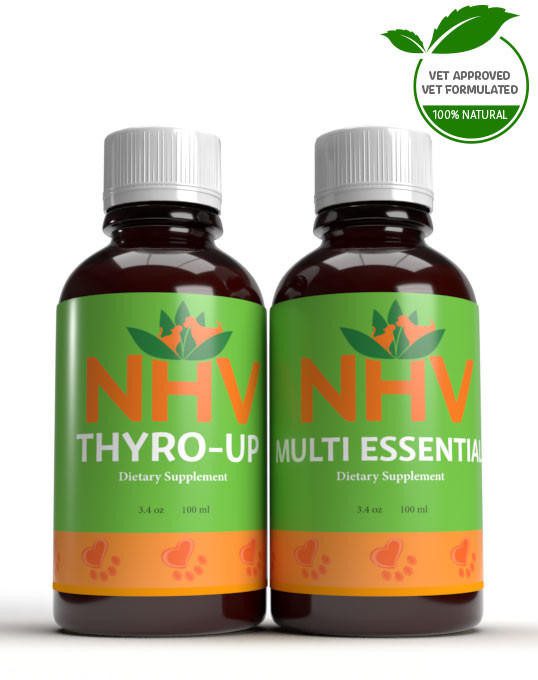
free shipping over $100 (USA & Canada)
1-877-937-4372 the pet expert hotline
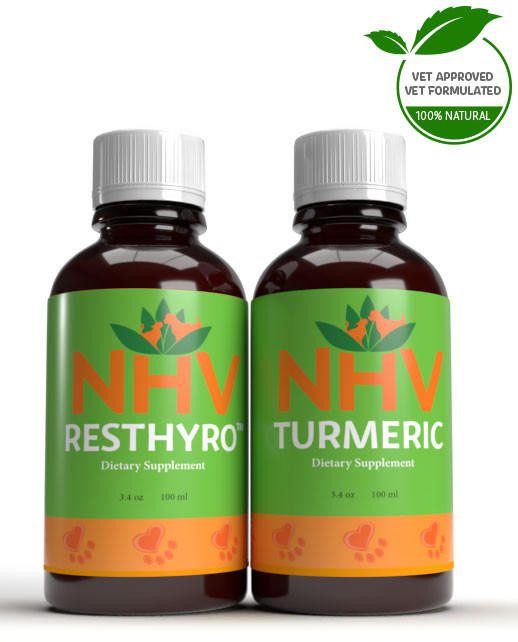
Natural Support for Hyperthyroidism in Cats & Pets

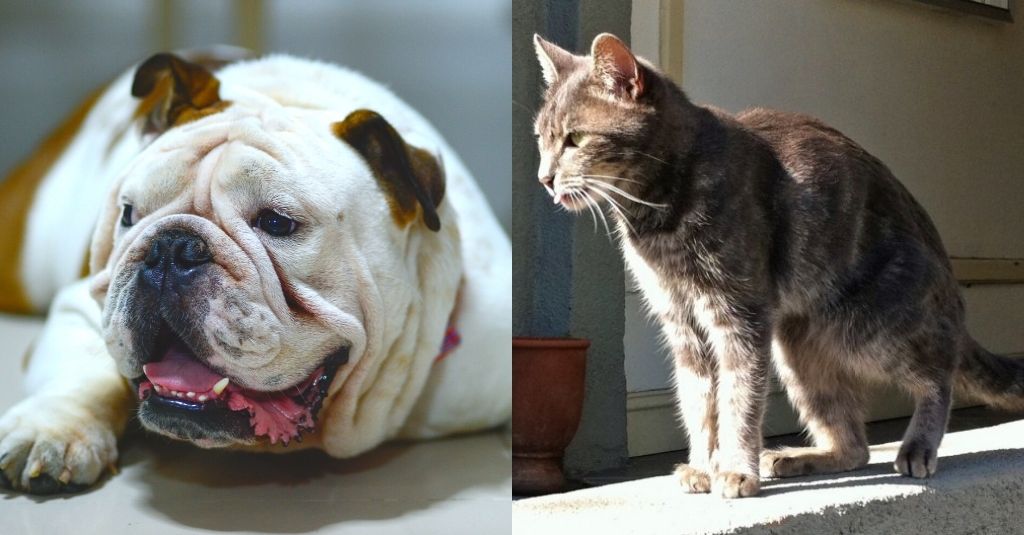
The difference between hyperthyroidism and hypothyroidism in pets can be very confusing. But, don’t worry, we’re here to help. The terms for describing both conditions are very similar and can cause a mix-up between the two. Both affect the thyroid but work in opposite ways. One way that I learned to remember the meaning for each condition in veterinary school, was that HYPO always refers to something being slow while HYPER always means that something is fast or overactive. For example, exactly how we would describe a kid after eating candy: hyperactive!
The thyroid hormone also known as T3 controls the body’s metabolic rate. In other words, it will decide how hard and how fast each cell will have to work to perform its function. The actual thyroid glands do not produce T3, they produce another form that is called T4. The different tissues in the body will absorb T4 and they turn it into T3.
Hyperthyroidism is a common condition in cats and does not affect dogs as often.
Hyperthyroidism is caused by growth from the thyroid gland that causes an overproduction of T4. As mentioned before, hyper means that things are moving at a faster pace so hyperthyroidism will cause your pet to lose a lot of weight, excessive thirst, restlessness, excessive eating, and urinating.
It is important to note that hyperthyroidism is a common condition in cats and does not affect dogs as often. Some of the symptoms associated with hyperthyroidism are:
As mentioned, hyperthyroidism is not found commonly in dogs but can be caused by hypothyroidism medication. This type of medication contains a synthetic form of thyroxine and can lead to hyperthyroidism.
Hyperthyroidism can be diagnosed with blood testing that will measure the levels of the thyroid hormones. Other blood samples may be taken for general testing in case of a secondary issue. It can be controlled with the use of the right medication. However, if it’s a tumor causing the problem, surgery may be required, and chemotherapy can also be an option.
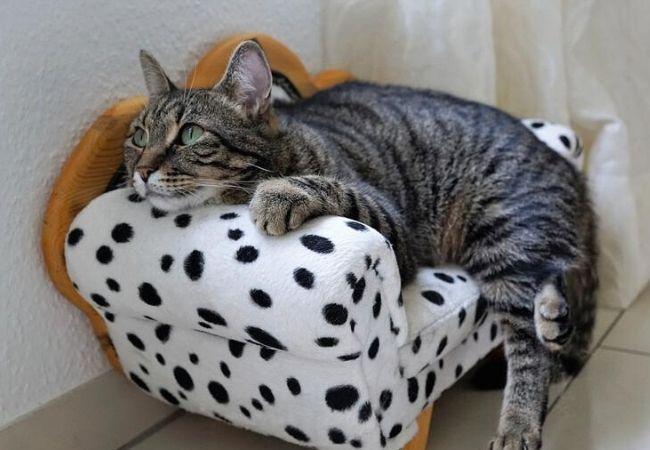
Hypothyroidism is more common in dogs than cats.
Hypothyroidism affects mainly canine companions. The thyroid glands fail to produce enough T4 and T3 hormones. This is generally caused by one of two things: lymphocytic thyroiditis or idiopathic thyroid gland atrophy. Lymphocytic thyroiditis is an autoimmune condition, and this means that the immune system attacks the thyroid, because it thinks it is abnormal. Unfortunately, we do not know why this occurs, but evidence shows that it is a heritable condition, therefore, the cause is for genetic reasons.
Symptoms of hypothyroidism are basically opposites to the symptoms of hyperthyroidism. Hypo is referring to everything slowing down, so some of the typical symptoms associated with it are:
Hypothyroidism is tested by doing a total thyroxin level (TT4). Like the test for hyperthyroidism, this will measure the thyroid hormone level in the blood. A definitive diagnosis is made by doing a free T4 by equilibrium dialysis. This will measure the levels of thyroxin and if the results show low levels then it is most likely hypothyroidism.
Neither of the above conditions has cures but both can be controlled using prescribed medication. The drug given is a thyroid replacement hormone and must be administered for the rest of your pet’s life. The dose will depend on your pet’s weight and thyroid levels. Sometimes the dose may need to be adjusted over time.
Hypothyroidism is a slow-developing condition and can often be misdiagnosed.
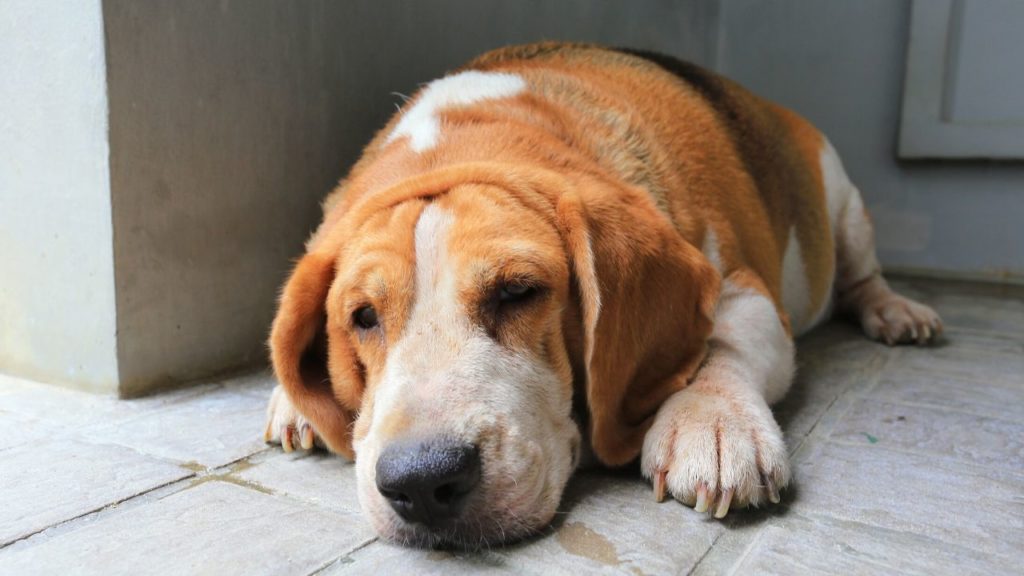
NHV offers different kits that can help support hyperthyroidism and hypothyroidism in pets This includes supplements:
If you have more questions about how to support your pet with hyperthyroidism or hypothyroidism, you can reach out to our pet experts. We are always happy to help.
hypothyroidism support

Thyro-Up & Multi Essentials
bundle and save with pet expert kits
3 month supply for a small to medium size pet
What is it?
Natural supplement bundle for dogs and cats that supports thyroid health, helps regulate hormone levels, promotes a healthy skin, coat, and metabolism, and may help fill nutritional gaps.
How Does it Work?
Why Should I Trust It?
100% natural supplements formulated and approved by vets.

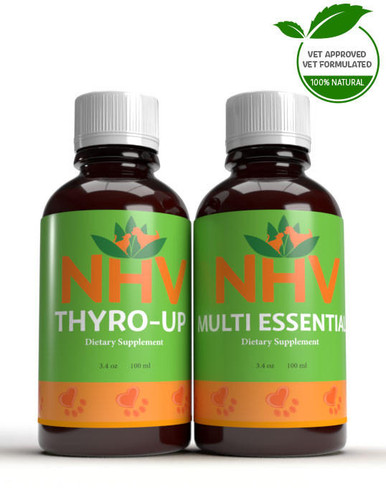
What is it?
Natural supplement bundle for dogs and cats that supports thyroid health, helps regulate hormone levels, promotes a healthy skin, coat, and metabolism, and may help fill nutritional gaps.
How Does it Work?
Why Should I Trust It?
100% natural supplements formulated and approved by vets.

Hypothyroidism is a slow-developing condition and may be misdiagnosed as normal signs of aging. For natural support, our Hypothyroidism Kit is beneficial for dogs and cats with lowered thyroid function who need added nutritional support.
Hypothyroidism (underactive thyroid) is a condition that affects many pets, including dogs and cats. Apart from slowing down, if you notice that your little one’s fur is thinning, their skin is dry and dull or they have sudden weight gain, you may want to book a visit with your vet to run some tests, including a TT4 test, which is a measurement of thyroid hormone levels in the blood.
For pets suffering with hypothyroidism, we'd suggest adding natural pet thyroid supplements like our Thyro-Up and Multi Essentials to support their glandular system as well as support their metabolism.
Hypothyroidism can cause a lot of discomfort for your pet. If left untreated, hypothyroidism may lead to secondary health issues like cardiovascular disease. Ingredients like eleuthero and ginkgo support healthy thyroid function, and brain function. Kelp is rich in iodine which helps activate the thyroid gland while ingredients like licorice and gotu kola contain many beneficial properties for stimulating thyroid hormone production. The antioxidant and sedative properties in Thyro Up help to protect the body from cell damage, and help to soothe inflammation and discomfort. Multi Essentials contains a range of vitamins, minerals and trace elements that are formulated to help stimulate metabolism, promote healthy skin/coat, improve digestion, energy levels and help to fill nutritional voids.
Part of being a pet parent is keeping your furry friend healthy and comfortable. When it comes to natural cat thyroid supplements, our blends have been developed by a holistic veterinarian and a master herbalist to formulate a gentle yet effective remedy to support glandular health. For any questions or concerns about your furkiddo’s thyroid function or overall vitality, an NHV Pet Expert is there to help you every step of the way.
Made with the finest, organically grown, or ethically harvested herbs. Made specifically for pets, vet-formulated, and vet approved.
Thyro-Up for Dogs and Cats
Multi Essentials
Select your pet's weight to determine the correct dose.
To be taken twice daily. Determine your pet’s weight and then use the easy chart below to determine the correct dose. This is the minimum dosage.
Pet's Weight Dosage
0 - 15 lb = 0.5 ml
16 - 30 lb = 1.0 ml
31 - 45 lb = 1.5 ml
46 - 60 lb = 2.0 ml
61 - 75 lb = 2.5 ml
Over 75 lb = 3.0 ml
How to Administer
Shake well before use. The easiest method is to use the dropper provided and place the drops into your pet’s food or favorite treat. You can also use the dropper and squirt directly into the pet’s mouth. Some pets can be finicky, if this occurs consider hiding the drops in foods most pet’s love such as fish, chicken or yogurt or a favorite treat. If your pet only eats dry food then soak a few kibbles at feeding time.
For Best Results
Herbal dietary supplements are beneficial to the health and well-being of your pet and are safe for long-term use. Every pet responds to natural herbal supplements differently, therefore it is important to be consistent and administer the product daily. Supplements generally take two to four weeks to take effect, however this will vary from one animal to the next.
Product Storage
All NHV Natural Pet Products are pure herbal extracts and contain no artificial additives, preservatives or coloring. Shelf life after opening is 6 months and must be refrigerated after opening.
Cautions and Contraindications
Do not use in pregnant or nursing animals.
All information provided by NHV Natural Pet Products is for educational purposes only.
Hypothyroidism is a slow-developing condition and may be misdiagnosed as normal signs of aging. For natural support, our Hypothyroidism Kit is beneficial for dogs and cats with lowered thyroid function who need added nutritional support.
Hypothyroidism (underactive thyroid) is a condition that affects many pets, including dogs and cats. Apart from slowing down, if you notice that your little one’s fur is thinning, their skin is dry and dull or they have sudden weight gain, you may want to book a visit with your vet to run some tests, including a TT4 test, which is a measurement of thyroid hormone levels in the blood.
For pets suffering with hypothyroidism, we'd suggest adding natural pet thyroid supplements like our Thyro-Up and Multi Essentials to support their glandular system as well as support their metabolism.
Hypothyroidism can cause a lot of discomfort for your pet. If left untreated, hypothyroidism may lead to secondary health issues like cardiovascular disease. Ingredients like eleuthero and ginkgo support healthy thyroid function, and brain function. Kelp is rich in iodine which helps activate the thyroid gland while ingredients like licorice and gotu kola contain many beneficial properties for stimulating thyroid hormone production. The antioxidant and sedative properties in Thyro Up help to protect the body from cell damage, and help to soothe inflammation and discomfort. Multi Essentials contains a range of vitamins, minerals and trace elements that are formulated to help stimulate metabolism, promote healthy skin/coat, improve digestion, energy levels and help to fill nutritional voids.
Part of being a pet parent is keeping your furry friend healthy and comfortable. When it comes to natural cat thyroid supplements, our blends have been developed by a holistic veterinarian and a master herbalist to formulate a gentle yet effective remedy to support glandular health. For any questions or concerns about your furkiddo’s thyroid function or overall vitality, an NHV Pet Expert is there to help you every step of the way.
Made with the finest, organically grown, or ethically harvested herbs. Made specifically for pets, vet-formulated, and vet approved.
Thyro-Up for Dogs and Cats
Multi Essentials
Select your pet's weight to determine the correct dose.
To be taken twice daily. Determine your pet’s weight and then use the easy chart below to determine the correct dose. This is the minimum dosage.
Pet's Weight Dosage
0 - 15 lb = 0.5 ml
16 - 30 lb = 1.0 ml
31 - 45 lb = 1.5 ml
46 - 60 lb = 2.0 ml
61 - 75 lb = 2.5 ml
Over 75 lb = 3.0 ml
How to Administer
Shake well before use. The easiest method is to use the dropper provided and place the drops into your pet’s food or favorite treat. You can also use the dropper and squirt directly into the pet’s mouth. Some pets can be finicky, if this occurs consider hiding the drops in foods most pet’s love such as fish, chicken or yogurt or a favorite treat. If your pet only eats dry food then soak a few kibbles at feeding time.
For Best Results
Herbal dietary supplements are beneficial to the health and well-being of your pet and are safe for long-term use. Every pet responds to natural herbal supplements differently, therefore it is important to be consistent and administer the product daily. Supplements generally take two to four weeks to take effect, however this will vary from one animal to the next.
Product Storage
All NHV Natural Pet Products are pure herbal extracts and contain no artificial additives, preservatives or coloring. Shelf life after opening is 6 months and must be refrigerated after opening.
Cautions and Contraindications
Do not use in pregnant or nursing animals.
All information provided by NHV Natural Pet Products is for educational purposes only.
hyperthyroidism support
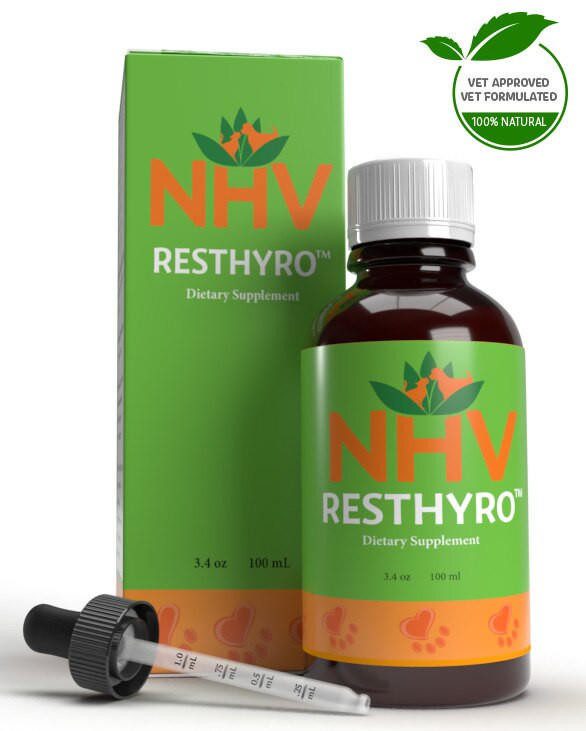
Support for Hyperthyroidism in Cats
buy 2 and save $3
3 month supply for a small to medium size
What is it?
A vet-formulated feline hyperthyroidism remedy designed to help balance thyroid function, as well as manage secondary feline hyperthyroidism symptoms.
How does it work?
Why trust it?
NHV Resthyro has helped cats around the world, like Penny, who has hyperthyroidism.
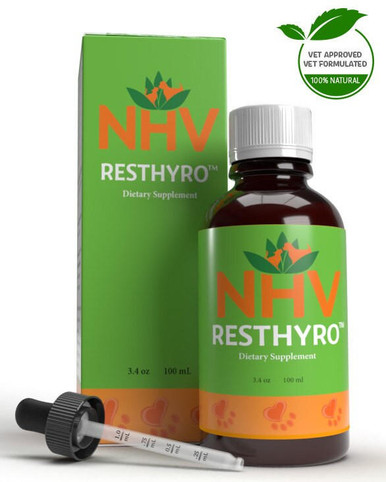
What is it?
A vet-formulated feline hyperthyroidism remedy designed to help balance thyroid function, as well as manage secondary feline hyperthyroidism symptoms.
How does it work?
Why trust it?
NHV Resthyro has helped cats around the world, like Penny, who has hyperthyroidism.
NHV Resthyro™ feline hyperthyroidism remedy is made with quality herbs that are formulated to work together to support the balance of your cat’s thyroid function, support the organs affected by hyperthyroidism, and support feline hyperthyroidism symptoms. This formula has helped to support feline hyperthyroidism, for thousands of pets across the world!
Resthyro™ was formulated by a holistic veterinarian and a master herbalist with a combined 50 years of experience treating pets. It’s made using powerful herbs such as eleuthero, bugleweed, lemon balm, and gotu kola. Together, these and other ingredients help to balance thyroid hormones in your pet’s body. They help your pet’s blood pressure healthier and promote better management of stress. As a feline hyperthyroidism remedy, this supplement can be taken alongside your vet’s prescribed medication to provide comprehensive support.
Hyperthyroidism in cats is caused by excess production of thyroid hormones (T3 and T4). One of the most common causes of feline hyperthyroidism is a hormone-producing benign tumor. Most cases of cats with hyperthyroidism are older pets (generally over 10 years of age).
Cats with symptoms of feline hyperthyroidism may also experience secondary problems such as mild liver, kidney, or heart disease.
NHV supplements include multiple all-natural remedies for feline hyperthyroidism. If your cat is experiencing liver problems, we suggest NHV Milk Thistle; for kidney issues, we suggest NHV Tripsy; and for heart conditions, we suggest combining NHV Hearty Heart with Resthyro™.
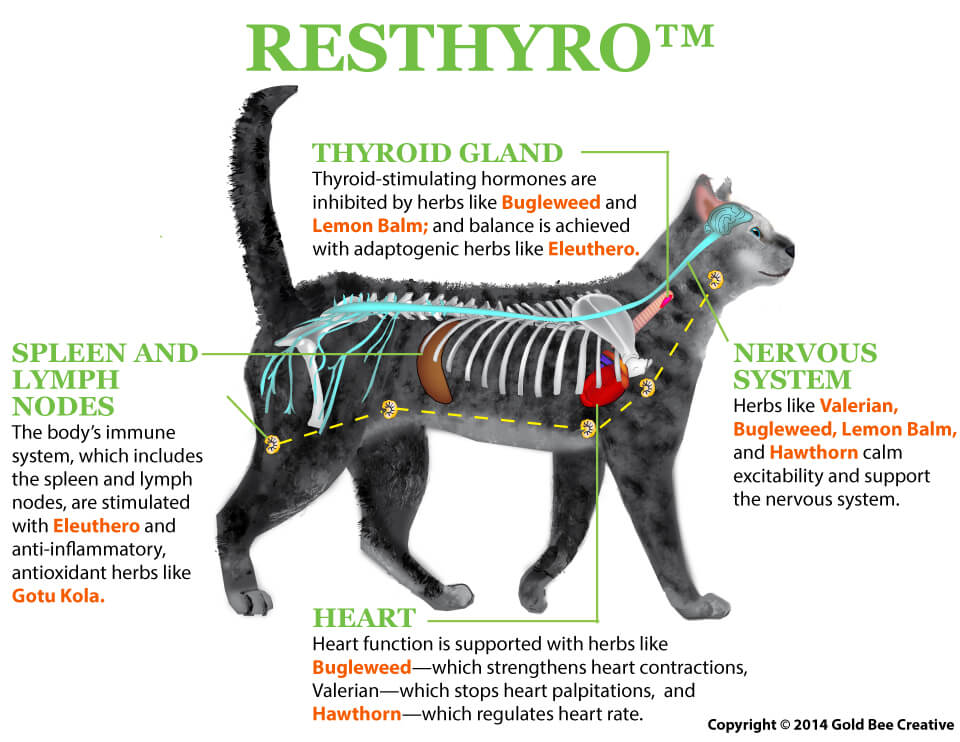
Eleuthero – Helps to balance the thyroid, stimulates the immune system, and helps to improve resistance to stress.
Bugleweed – Helps to reduce thyroid hormones in the body. It also slows and strengthens heart contractions. Relieves tension and irritability, and acts as a cough suppressant.
Lemon Balm – Inhibits thyroid activity by blocking thyroid-stimulating hormones. Also found to reduce stress, decrease blood pressure, and improve gastrointestinal activity.
Gotu Kola – A small green herb known for its cleansing abilities and used to treat skin problems. It also has strong antioxidant, antibacterial, and anti-inflammatory properties.
Hawthorn – Helps strengthen and improve heart function.
Skullcap – Known for its relaxing and detoxifying qualities, as well as its ability to stimulate kidney function.
Valerian – Well known for its use in the treatment of anxiety, and has been used extensively as a mild sedative and pain reliever.
Select your pet's weight to determine the correct dose.
To be taken twice daily. Determine your pet’s weight and then use the easy chart below to determine the correct dose. This is the minimum dosage.
Pet's Weight Dosage
0 - 15 lb = 0.5 ml
16 - 30 lb = 1.0 ml
31 - 45 lb = 1.5 ml
46 - 60 lb = 2.0 ml
61 - 75 lb = 2.5 ml
Over 75 lb = 3.0 ml
How to Administer
Shake well before use. The easiest method is to use the dropper provided and place the drops into your pet’s food or favorite treat. You can also use the dropper and squirt directly into the pet’s mouth.
Some pets can be finicky, if this occurs consider hiding the drops in foods most pet’s love such as fish, chicken or yogurt or a favourite treat. If your pet only eats dry food then soak a few kibbles at feeding time.
For Best Results
Herbal dietary supplements are beneficial to the health and well-being of your pet and are safe for long-term use. Every pet responds to natural herbal supplements differently, therefore it is important to be consistent and administer the product daily. Supplements generally take two to four weeks to take effect, however this will vary from one animal to the next.
Product Storage
All NHV Natural Pet Products are pure herbal extracts and contain no artificial additives, preservatives or coloring. Shelf life after opening is 6 months and must be refrigerated after opening.
Cautions and Contraindications
Do not use Resthyro™ in pregnant or nursing animals. Should not be used in animals with hypothyroidism (under active thyroid gland). Speak to your vet before using our products. A second visit is recommended if your pet’s condition does not improve, or deteriorates after continued use of the supplements.
All information provided by NHV Natural Pet Products is for educational purposes only.
NHV Resthyro™ feline hyperthyroidism remedy is made with quality herbs that are formulated to work together to support the balance of your cat’s thyroid function, support the organs affected by hyperthyroidism, and support feline hyperthyroidism symptoms. This formula has helped to support feline hyperthyroidism, for thousands of pets across the world!
Resthyro™ was formulated by a holistic veterinarian and a master herbalist with a combined 50 years of experience treating pets. It’s made using powerful herbs such as eleuthero, bugleweed, lemon balm, and gotu kola. Together, these and other ingredients help to balance thyroid hormones in your pet’s body. They help your pet’s blood pressure healthier and promote better management of stress. As a feline hyperthyroidism remedy, this supplement can be taken alongside your vet’s prescribed medication to provide comprehensive support.
Hyperthyroidism in cats is caused by excess production of thyroid hormones (T3 and T4). One of the most common causes of feline hyperthyroidism is a hormone-producing benign tumor. Most cases of cats with hyperthyroidism are older pets (generally over 10 years of age).
Cats with symptoms of feline hyperthyroidism may also experience secondary problems such as mild liver, kidney, or heart disease.
NHV supplements include multiple all-natural remedies for feline hyperthyroidism. If your cat is experiencing liver problems, we suggest NHV Milk Thistle; for kidney issues, we suggest NHV Tripsy; and for heart conditions, we suggest combining NHV Hearty Heart with Resthyro™.

Eleuthero – Helps to balance the thyroid, stimulates the immune system, and helps to improve resistance to stress.
Bugleweed – Helps to reduce thyroid hormones in the body. It also slows and strengthens heart contractions. Relieves tension and irritability, and acts as a cough suppressant.
Lemon Balm – Inhibits thyroid activity by blocking thyroid-stimulating hormones. Also found to reduce stress, decrease blood pressure, and improve gastrointestinal activity.
Gotu Kola – A small green herb known for its cleansing abilities and used to treat skin problems. It also has strong antioxidant, antibacterial, and anti-inflammatory properties.
Hawthorn – Helps strengthen and improve heart function.
Skullcap – Known for its relaxing and detoxifying qualities, as well as its ability to stimulate kidney function.
Valerian – Well known for its use in the treatment of anxiety, and has been used extensively as a mild sedative and pain reliever.
Select your pet's weight to determine the correct dose.
To be taken twice daily. Determine your pet’s weight and then use the easy chart below to determine the correct dose. This is the minimum dosage.
Pet's Weight Dosage
0 - 15 lb = 0.5 ml
16 - 30 lb = 1.0 ml
31 - 45 lb = 1.5 ml
46 - 60 lb = 2.0 ml
61 - 75 lb = 2.5 ml
Over 75 lb = 3.0 ml
How to Administer
Shake well before use. The easiest method is to use the dropper provided and place the drops into your pet’s food or favorite treat. You can also use the dropper and squirt directly into the pet’s mouth.
Some pets can be finicky, if this occurs consider hiding the drops in foods most pet’s love such as fish, chicken or yogurt or a favourite treat. If your pet only eats dry food then soak a few kibbles at feeding time.
For Best Results
Herbal dietary supplements are beneficial to the health and well-being of your pet and are safe for long-term use. Every pet responds to natural herbal supplements differently, therefore it is important to be consistent and administer the product daily. Supplements generally take two to four weeks to take effect, however this will vary from one animal to the next.
Product Storage
All NHV Natural Pet Products are pure herbal extracts and contain no artificial additives, preservatives or coloring. Shelf life after opening is 6 months and must be refrigerated after opening.
Cautions and Contraindications
Do not use Resthyro™ in pregnant or nursing animals. Should not be used in animals with hypothyroidism (under active thyroid gland). Speak to your vet before using our products. A second visit is recommended if your pet’s condition does not improve, or deteriorates after continued use of the supplements.
All information provided by NHV Natural Pet Products is for educational purposes only.
hypothyroidism support
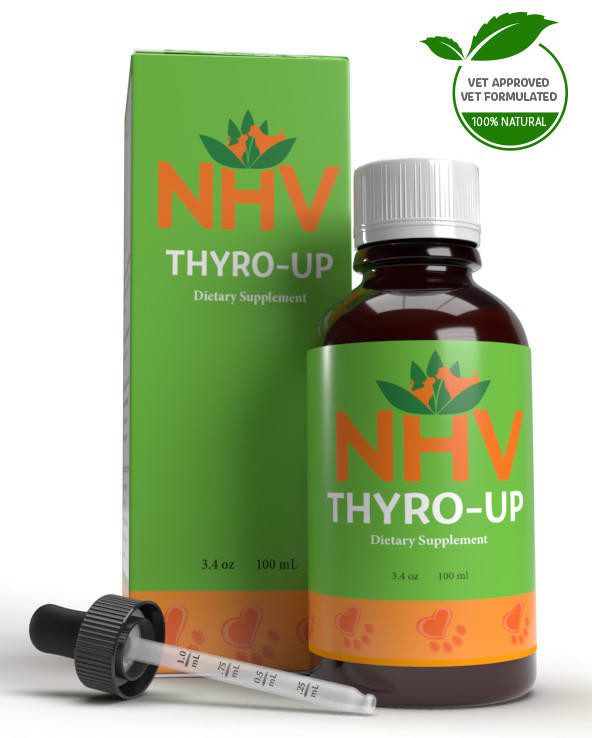
Support for Dogs with Hypothyroidism
buy 2 and save $3
3 month supply for a small to medium size
What is it?
Support your pet’s hypothyroidism with Thyro-Up, an all-natural dog thyroid supplement that helps boost energy and may help promote normal hormone levels within the thyroid gland.
How does it work?
Why trust it?
NHV Thyro-Up is made with the finest human-grade herbs that are free from pesticides and artificial ingredients.
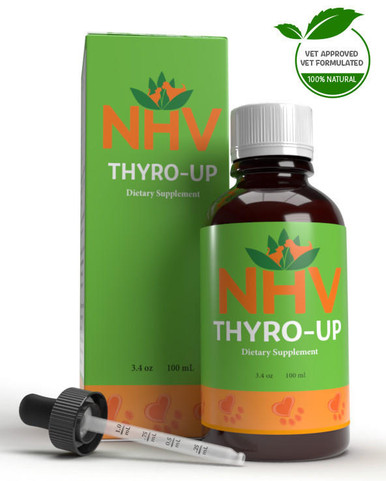
What is it?
Support your pet’s hypothyroidism with Thyro-Up, an all-natural dog thyroid supplement that helps boost energy and may help promote normal hormone levels within the thyroid gland.
How does it work?
Why trust it?
NHV Thyro-Up is made with the finest human-grade herbs that are free from pesticides and artificial ingredients.
Powerful Thyroid Support for Your Dog
Hypothyroidism can be a real bummer for dogs. It’s a condition that primarily affects older dogs, and comes with symptoms like weight gain, loss of appetite, sluggishness, and hair loss. In addition to the medication prescribed by your pet’s vet, a natural thyroid supplement for your dog can help give them comprehensive support. Thyro-Up is used to support hypothyroidism in dogs.
How Thyro-Up Can Help Your Dog with Hypothyroidism
NHV supplements are formulated with ingredients that are powerful, yet easy on your pet’s body. Thyro-Up is a thyroid supplement for dogs made with ingredients like Gotu Kola, Kelp, Astragalus, and Eleuthero. These plant-based extracts help balance hormones, stimulate an underactive thyroid gland, empower the immune system, and keep a healthy metabolism.
Thyro-Up is safe to take with conventional medicines, and safe to take long-term. Use it together with treatment prescribed by your dog’s veterinarian for comprehensive and effective support.
Use Thyro-Up for Comprehensive Support
Help support your dog’s thyroid function and maintain natural thyroid hormone production with Thyro-Up, an all-natural dog thyroid supplement developed by veterinarians with 20+ years of experience. Have questions? Contact us on the pet expert hotline at 1-877-9374372.
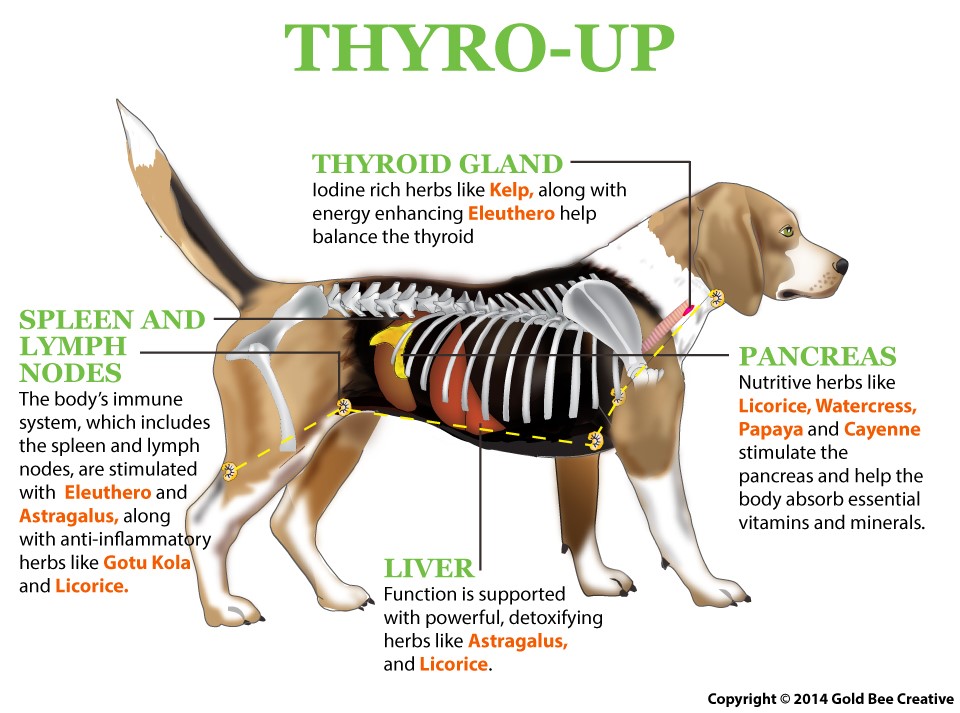
Eleuthero – Helps balance the thyroid and maintain a healthy metabolism.
Kelp – This iodine-rich ingredient stimulates the underactive thyroid gland.
Astragalus – A sweet tonic herb that helps support the thyroid gland and maintains the immune and circulatory systems.
Gotu Kola – A mild diuretic that helps balance hormones. High in antioxidants and beneficial to the skin and coat.
Ginkgo – A kidney tonic that helps maintain body temperature. Supports the cardiovascular and nervous systems.
Licorice – A natural anti-inflammatory with immune-supporting properties.
Watercress – A vitamin and mineral-rich plant that supports digestion.
Papaya – Helps aid digestion and the absorption of nutrients from food.
Cayenne – Helps support the circulatory and digestive systems.
Select your pet's weight to determine the correct dose.
To be taken twice daily. Determine your pet’s weight and then use the easy chart below to determine the correct dose. This is the minimum dosage.
Pet's Weight Dosage
0 - 15 lb = 0.5 ml
16 - 30 lb = 1.0 ml
31 - 45 lb = 1.5 ml
46 - 60 lb = 2.0 ml
61 - 75 lb = 2.5 ml
Over 75 lb = 3.0 ml
How to Administer
Shake well before use. The easiest method is to use the dropper provide and places the drops into your pet’s food or favorite treat. You can also use the dropper and squirt directly into the pet’s mouth.
Some pets can be finicky, if this occurs consider hiding the drops in foods most pet’s love such as fish, chicken or yogurt or a favorite treat. If your pet only eats dry food then soak a few kibbles at feeding time.
For Best Results
Herbal dietary supplements are beneficial to the health and wellbeing of your pet and are safe for long-term use. Every pet responds to natural herbal supplements differently, therefore it is important to be consistent and administer the product daily. Supplements generally take two to four weeks to take effect, however this will vary from one animal to the next.
Product Storage
All NHV Natural Pet Products are pure herbal extracts and contain no artificial additives, preservatives or coloring. Shelf life after opening is 6 months and must be refrigerated after opening.
Cautions and Contraindications
Do not use Thyro-Up in pregnant or nursing animals.
Do not use if your pet has hyperthyroidism (over active thyroid gland). Speak to your vet before using our products. A second visit is recommended if your pet’s condition does not improve, or deteriorates after continued use of the supplements.
All information provided by NHV Natural Pet Products is for educational purposes only.
Powerful Thyroid Support for Your Dog
Hypothyroidism can be a real bummer for dogs. It’s a condition that primarily affects older dogs, and comes with symptoms like weight gain, loss of appetite, sluggishness, and hair loss. In addition to the medication prescribed by your pet’s vet, a natural thyroid supplement for your dog can help give them comprehensive support. Thyro-Up is used to support hypothyroidism in dogs.
How Thyro-Up Can Help Your Dog with Hypothyroidism
NHV supplements are formulated with ingredients that are powerful, yet easy on your pet’s body. Thyro-Up is a thyroid supplement for dogs made with ingredients like Gotu Kola, Kelp, Astragalus, and Eleuthero. These plant-based extracts help balance hormones, stimulate an underactive thyroid gland, empower the immune system, and keep a healthy metabolism.
Thyro-Up is safe to take with conventional medicines, and safe to take long-term. Use it together with treatment prescribed by your dog’s veterinarian for comprehensive and effective support.
Use Thyro-Up for Comprehensive Support
Help support your dog’s thyroid function and maintain natural thyroid hormone production with Thyro-Up, an all-natural dog thyroid supplement developed by veterinarians with 20+ years of experience. Have questions? Contact us on the pet expert hotline at 1-877-9374372.

Eleuthero – Helps balance the thyroid and maintain a healthy metabolism.
Kelp – This iodine-rich ingredient stimulates the underactive thyroid gland.
Astragalus – A sweet tonic herb that helps support the thyroid gland and maintains the immune and circulatory systems.
Gotu Kola – A mild diuretic that helps balance hormones. High in antioxidants and beneficial to the skin and coat.
Ginkgo – A kidney tonic that helps maintain body temperature. Supports the cardiovascular and nervous systems.
Licorice – A natural anti-inflammatory with immune-supporting properties.
Watercress – A vitamin and mineral-rich plant that supports digestion.
Papaya – Helps aid digestion and the absorption of nutrients from food.
Cayenne – Helps support the circulatory and digestive systems.
Select your pet's weight to determine the correct dose.
To be taken twice daily. Determine your pet’s weight and then use the easy chart below to determine the correct dose. This is the minimum dosage.
Pet's Weight Dosage
0 - 15 lb = 0.5 ml
16 - 30 lb = 1.0 ml
31 - 45 lb = 1.5 ml
46 - 60 lb = 2.0 ml
61 - 75 lb = 2.5 ml
Over 75 lb = 3.0 ml
How to Administer
Shake well before use. The easiest method is to use the dropper provide and places the drops into your pet’s food or favorite treat. You can also use the dropper and squirt directly into the pet’s mouth.
Some pets can be finicky, if this occurs consider hiding the drops in foods most pet’s love such as fish, chicken or yogurt or a favorite treat. If your pet only eats dry food then soak a few kibbles at feeding time.
For Best Results
Herbal dietary supplements are beneficial to the health and wellbeing of your pet and are safe for long-term use. Every pet responds to natural herbal supplements differently, therefore it is important to be consistent and administer the product daily. Supplements generally take two to four weeks to take effect, however this will vary from one animal to the next.
Product Storage
All NHV Natural Pet Products are pure herbal extracts and contain no artificial additives, preservatives or coloring. Shelf life after opening is 6 months and must be refrigerated after opening.
Cautions and Contraindications
Do not use Thyro-Up in pregnant or nursing animals.
Do not use if your pet has hyperthyroidism (over active thyroid gland). Speak to your vet before using our products. A second visit is recommended if your pet’s condition does not improve, or deteriorates after continued use of the supplements.
All information provided by NHV Natural Pet Products is for educational purposes only.
Published: June 19, 2020